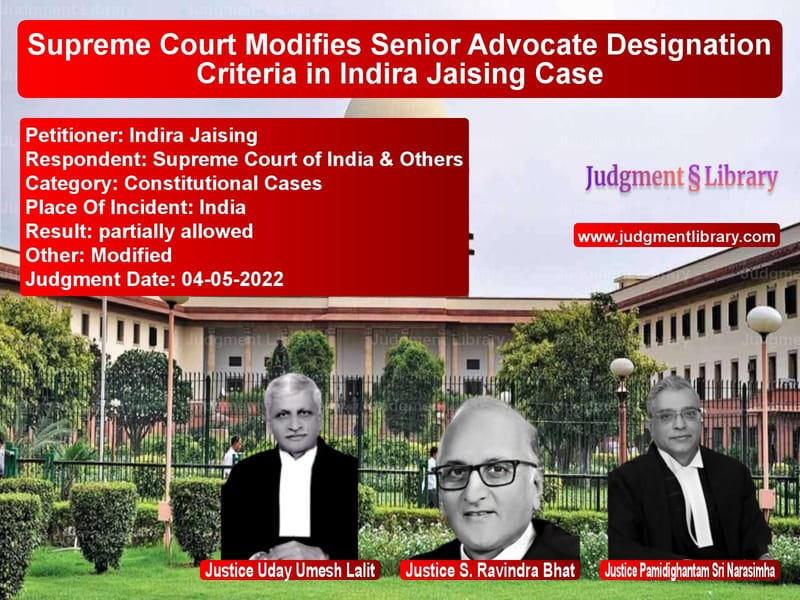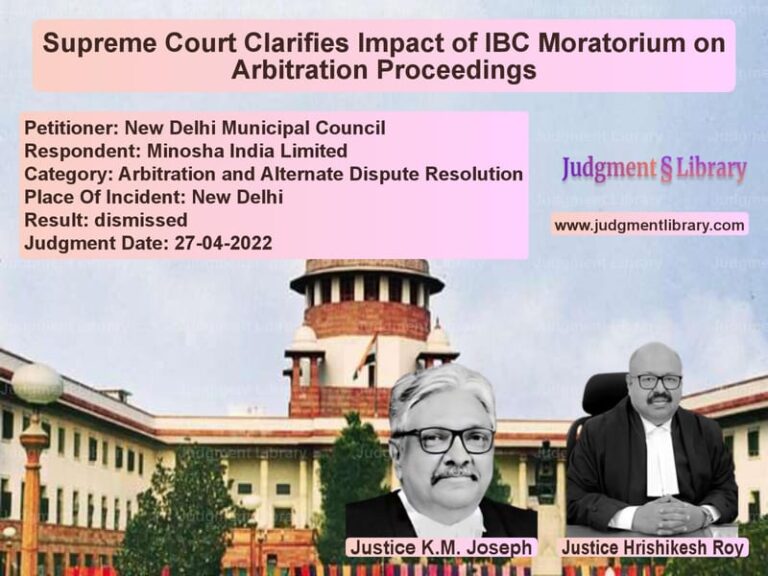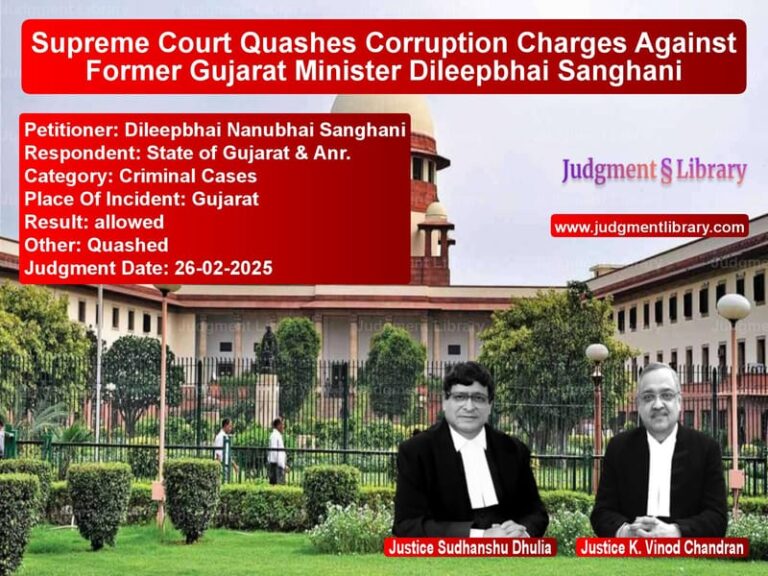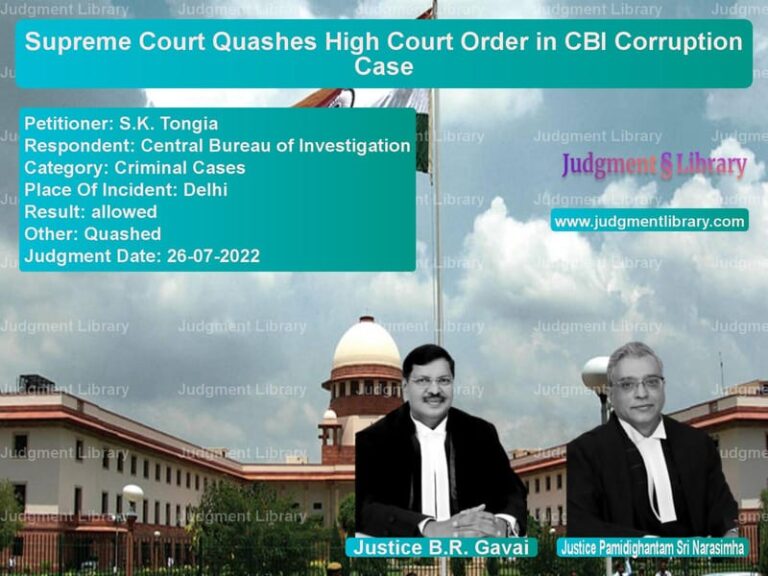Supreme Court Modifies Senior Advocate Designation Criteria in Indira Jaising Case
The Supreme Court of India recently ruled on a significant case related to the designation of senior advocates in Indira Jaising vs. Supreme Court of India & Others. The petitioner, a senior advocate, sought changes to the existing criteria for evaluating lawyers seeking senior advocate status. The Court upheld the need for a fairer distribution of marks for experience and transparency in the selection process while maintaining the integrity of the merit-based system.
Background of the Case
The case originates from the 2017 Supreme Court judgment in Indira Jaising vs. Supreme Court of India, which introduced guidelines for designating senior advocates. These guidelines established a structured evaluation system, where candidates were assessed on their experience, publications, pro bono work, and interview performance.
Indira Jaising, a distinguished lawyer, challenged aspects of this system, particularly the allocation of marks based on years of experience. She contended that the existing scheme unfairly treated advocates with 17 to 19 years of practice compared to those with exactly 20 years, leading to inequitable results in senior advocate designations.
Key Issues Raised
- Should marks for experience be allocated progressively instead of in fixed brackets?
- Does the selection process ensure transparency, especially in the interview round?
- Should there be clear criteria for the final voting process by the Full Court?
Arguments of the Petitioner
- Advocates with 17 to 19 years of experience should be awarded marks on a sliding scale rather than being grouped under a fixed bracket.
- The allocation of a fixed 10 marks for all candidates with 10 to 20 years of experience led to arbitrary disadvantages for those just shy of 20 years.
- Transparency must be ensured in the selection process, including the disclosure of cut-off marks for selection.
- If a secret ballot is used for final selection, the reasons should be recorded in writing.
- The Full Court’s power to designate should not be exercised arbitrarily without accountability.
Arguments of the Respondents
- The Solicitor General contended that the entire evaluation system required reconsideration, including whether an interview should be mandatory.
- The existing system balanced various factors to ensure merit-based selection.
- The allocation of marks had been designed to reward overall legal experience rather than incremental differences.
- Revising the marking scheme might require further deliberation by the Full Court.
Supreme Court’s Observations
The Supreme Court analyzed the fairness of the current evaluation system. Key observations included:
- The existing system created a disparity between advocates with similar experience levels.
- Advocates with 19 years of practice should not be at a significant disadvantage compared to those with 20 years.
- The allocation of a fixed 10 marks for experience between 10 to 20 years was arbitrary.
- The evaluation system must be adjusted to account for progressive experience levels.
- Transparency in the final voting process should be maintained to avoid ambiguity.
The Court held:
“Instead of allocating a fixed 10 marks, the marks shall be assigned progressively, ensuring that every year of practice beyond 10 years is duly recognized.”
Judgment and Directions
- The Supreme Court modified the senior advocate designation rules to allocate marks proportionate to experience.
- For each year of experience beyond 10 years, one additional mark shall be assigned.
- The new rule takes effect immediately.
- Other aspects of the evaluation system remain unchanged for now.
- The Full Court must ensure recorded reasoning in cases of rejection via secret ballot.
Key Takeaways from the Judgment
- The ruling ensures a fairer assessment of advocates applying for senior designation.
- Transparency in the selection process is reinforced.
- The decision prevents arbitrary allocation of marks in professional evaluations.
- Judicial review of administrative decision-making in legal profession governance is affirmed.
- The role of the Full Court in senior advocate designations must be exercised responsibly.
Implications of the Judgment
The ruling sets a precedent for future legal profession reforms in India. The decision impacts:
- Merit-Based Selection: Ensuring that experience is evaluated fairly and proportionately.
- Judicial Accountability: Courts must follow structured guidelines in designating senior advocates.
- Legal Career Progression: Lawyers seeking senior advocate status will benefit from a more equitable system.
- Bar Council Reforms: The decision may influence broader changes in how legal appointments are handled.
Conclusion
The Supreme Court’s ruling in Indira Jaising vs. Supreme Court of India marks an important step in refining the senior advocate designation process. By ensuring a more equitable distribution of marks for experience, the judgment promotes fairness and meritocracy in legal appointments. This decision strengthens transparency, preventing arbitrary decisions in the selection of senior advocates and reinforcing the credibility of the legal profession.
Petitioner Name: Indira Jaising.Respondent Name: Supreme Court of India & Others.Judgment By: Justice Uday Umesh Lalit, Justice S. Ravindra Bhat, Justice Pamidighantam Sri Narasimha.Place Of Incident: India.Judgment Date: 04-05-2022.
Don’t miss out on the full details! Download the complete judgment in PDF format below and gain valuable insights instantly!
Download Judgment: indira-jaising-vs-supreme-court-of-ind-supreme-court-of-india-judgment-dated-04-05-2022.pdf
Directly Download Judgment: Directly download this Judgment
See all petitions in Fundamental Rights
See all petitions in Public Interest Litigation
See all petitions in Constitution Interpretation
See all petitions in Judgment by Uday Umesh Lalit
See all petitions in Judgment by S Ravindra Bhat
See all petitions in Judgment by P.S. Narasimha
See all petitions in partially allowed
See all petitions in Modified
See all petitions in supreme court of India judgments May 2022
See all petitions in 2022 judgments
See all posts in Constitutional Cases Category
See all allowed petitions in Constitutional Cases Category
See all Dismissed petitions in Constitutional Cases Category
See all partially allowed petitions in Constitutional Cases Category







